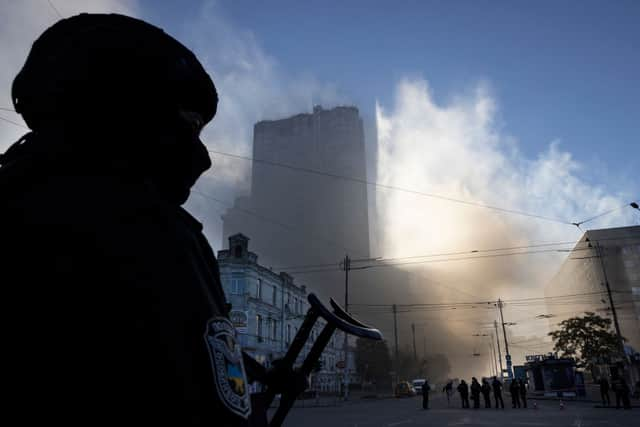What is a dirty bomb? Could Ukraine or Russia use them in war, definition - Putin and Shoigu claims explained
and live on Freeview channel 276
Russia's defence chief has claimed Ukraine is planning a "provocation" involving a radioactive weapon, a bold assertion firmly denied by Ukrainian and British officials.
The claim comes amid escalating tensions as Moscow seeks to halt Ukrainian advances in the south, and was made by Russia’s Defence Minister Sergei Shoigu during phone discussions with his counterparts from the United States, Britain, France, and Turkey.
Advertisement
Hide AdAdvertisement
Hide AdRussian officials have often claimed that Ukraine may detonate a dirty bomb in a “false flag” attack and blame it on Moscow. In turn, Ukrainian authorities have accused the Kremlin of hatching such a plan.
But what is a ‘dirty bomb’, are Ukraine or Russia really planning to use one, and could it heighten the chances of a nuclear war?
Here is everything you need to know.
What is a ‘dirty bomb’?


A 'dirty bomb’ is a device that utilises explosives to scatter radioactive waste. Such weapons do not generally cause the same devastation as a “full” nuclear detonation, but can expose large areas to radioactive contamination.
Although such devices are intended to scatter radioactive material over a vast area, bombs that employ conventional explosives and generate blast waves are significantly more dangerous to people than the hazard caused by radioactive material.
Advertisement
Hide AdAdvertisement
Hide AdHistorical test explosions suggest that once the damage of the initial explosive blast wave is done, a dirty bomb would leave insufficient radiation to induce severe disease or death. A US Department of Energy studyfound that even if no efforts were made to clean up an affected region, and civilians stayed in the impacted area for one year, the radiation exposure would be "fairly high", but not lethal.
Many governments do not consider dirty bombs to be weapons of mass destruction, since they are unlikely to cause many deaths from radioactive exposure. Instead, they are sometimes referred to as "weapons of mass disruption,” as they are more likely to cause psychological harm and mass panic.
Is Ukraine really planning to use one?
The claims of Russia’s Defence Minister were strongly refuted by British Defence Secretary Ben Wallace, who warned Moscow against using such allegations as a justification for escalation in the conflict.
The British Ministry of Defence (MoD) noted that Mr Shoigu in a call with Wallace “alleged that Ukraine was planning actions facilitated by Western countries, including the UK, to escalate the conflict in Ukraine”.
Advertisement
Hide AdAdvertisement
Hide Ad“The Defence Secretary refuted these claims and cautioned that such allegations should not be used as a pretext for greater escalation,” the ministry said.
“The Defence Secretary also reiterated UK and wider international support for Ukraine and desire to de-escalate this conflict.”
Ukrainian President Volodymyr Zelensky said the international community was unlikely to believe Sergei Shoigu's statements, and in turn claimed that Moscow was preparing to deploy a radioactive device on Ukrainian territory.
“If Russia calls and says that Ukraine is allegedly preparing something, it means only one thing: that Russia has already prepared all of it,” Zelensky said in a televised address on Sunday (23 October) evening.
Advertisement
Hide AdAdvertisement
Hide AdUkraine's top diplomat, Dmytro Kuleba, said his country does not currently possess dirty bombs, and has no ambitions to acquire them.
Despite a name that suggests improvised explosive devices quickly patched together with old parts, dirty bombs are difficult to manufacture and transport, and building an effective weapon that doesn’t cause radiation damage to its handlers before detonation is hard.
Significant shielding is required to stop the radioactive material from leaking out, but not so much that it makes the devices difficult to transport or launch. As such, dirty bombs are still classified as "high-tech" weapons by many.
They are also expensive, with the potential to cause long-term economic harm to those they are used against; the containment and decontamination of thousands of victims, as well as the decontamination of affected areas, may take a significant amount of time and money, rendering large areas of land partially unusable.
If Ukraine or Russia were planning to use a dirty bomb on territory they aim to control, they would have to account for the long-term damage that would be caused, even after any conflict is over.
Comment Guidelines
National World encourages reader discussion on our stories. User feedback, insights and back-and-forth exchanges add a rich layer of context to reporting. Please review our Community Guidelines before commenting.
